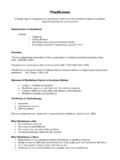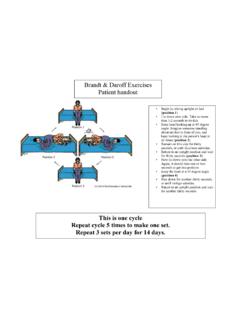Transcription of The Spiritual Exercises
1 The Spiritual Exercises of St. Ignatius of Loyola TRANSLATED FROM. THE AUTOGRAPH. BY. FATHER ELDER MULLAN, NEW YORK. KENEDY & SONS. PRINTERS TO THE HOLY APOSTOLIC SEE. Published as PDF-document by , the Digital Catholic Bookstoore Facultatem concedimus ut liber cui titulus The Spiritual Exercises of St. Ignatius of Loyola translated from the Autograph by Father Elder Mullan, , typis edatur, si iis ad quos spectat ita videbitur. FRANCISCUS XAV. WERNZ. Praepositus Generalis Societatis Jesu Nihil Obstat Remigius Lafort, , Censor Imprimatur John Cardinal Farley, Archiepiscopus Neo-Eboracensis, Neo-Eboraci Die 25 Aprilis, 1914.
2 Imprimatur Fr. Albert Lepidi, , Mag. Sac. Pal. Imprimatur Joseph Ceppetelli, Patriarcha Constantinop. Vicesgerens COPYRIGHT, 1914. BY KENEDY & SONS. APPROBATION OF THE LATIN TEXTS. The Exercises were offered for ecclesiastical censure at Rome. The text submitted was not, however, the one which is here reproduced, but two Latin translations, one in more polished Latin -- since called the Vulgate Version -- and one a literal rendering. The opinions expressed on these versions, as also the formal approval of Paul III, are given here, as applying quite entirely to the text from which the translations were made. VULGATE VERSION.
3 We have read everything compiled in the volume: it has greatly pleased us and seemed remarkably conducive to the salvation of souls. THE CARDINAL OF BURGOS. We grant leave to print the work; it is worthy of all praise and very profitable to the Christian profession. PHILIP, Vicar. Such holy Exercises cannot but afford the greatest profit to any one who studies them. They should therefore be received with open arms. FR. AEGIDIUS FOSCARARIUS, Master of the Sacred Palace LITERAL VERSION. We have read these Spiritual Exercises , They greatly please us and we judge them worthy of being received and highly esteemed by all who practise the orthodox faith.
4 THE CARDINAL OF BURGOS. We grant leave to print this work; it is worthy of all praise and very profitable to the Christian profession. PHILIP, Vicar. As the Christian religion cannot long subsist without some Spiritual Exercises and meditations -- for the Psalmist says: In my meditation a fire flames out -- I. think none more appropriate than these, which undoubtedly have had their source in the study of the Scriptures and in long experience. FR. AEGIDIUS FOSCARARIUS, Master of the Sacred Palace PAUL III, POPE. FOR A PERPETUAL REMEMBRANCE. The cares of the pastoral charge of the whole flock of Christ entrusted to Us and Our devotion to the glory and praise of God impel Us to embrace what helps the salvation of souls and their Spiritual profit, and cause Us to hearken to those who petition Us for what can foster and nourish piety in the faithful.
5 So Our beloved son, Francis de Borgia, Duke of Gandia, has lately brought it to Our notice that Our beloved son Ignatius de Loyola, General of the Society of Jesus, erected by Us in Our beloved City and confirmed by Our Apostolic authority, has compiled certain instructions, or Spiritual Exercises , drawn from Holy Writ and from experience in the Spiritual life, and has reduced them to an order which is excellently adapted to move piously the souls of the faithful, and that they are very useful and wholesome for the Spiritual consolation and profit of the same. This the said Duke Francis has come to know by report from many places and by clear evidence at Barcelona, Valencia and Gandia.
6 Hence he has humbly begged Us to cause the aforesaid instructions and Spiritual Exercises to be examined, so that their fruit may be more spread, and more of the faithful may be induced to use them with greater devotion. And he has begged Us, should We find them worthy, to approve and praise them and out of Our Apostolic goodness to make other provision in the premisses. We, therefore, have caused these instructions and Exercises to be examined, and by the testimony of and report made to Us by Our beloved son John Cardinal Priest of the Title of St. Clement, Bishop of Burgos and Inquisitor, Our venerable Brother Philip, Bishop of Saluciae, and Our Vicar General in things Spiritual at Rome, and Our beloved son Aegidius Foscararius, Master of Our Sacred Palace, have found that these Exercises are full of piety and holiness and that they are and will be extremely useful and salutary for the Spiritual profit of the faithful.
7 We have, besides, as We should, due regard to the rich fruits which Ignatius and the aforesaid Society founded by him are constantly producing everywhere in the Church of God, and to the very great help which the said Exercises have proved in this. Moved, then, by this petition, with the aforesaid authority, by these presents, and of Our certain knowledge, We approve, praise, and favor with the present writing the aforesaid instructions and Exercises and all and everything contained in them, and We earnestly exhort all and each of the faithful of both sexes everywhere to employ instructions and Exercises so pious and to be instructed by them.
8 [Here follow regulations for the diffusion of the book, and then confirmatory clauses.]. Given at St. Mark's in Rome under the seal of the Fisherman, 31 July, 1548, in the 14th year of Our Pontificate. BLO. EL. FULGINEN. PREFACE. THE present translation of the Exercises of St. Ignatius has been made from the Spanish Autograph of St. Ignatius. The copy so designated is not indeed in the handwriting of the Saint, but has a good number of corrections made by him and is known to have been used by him in giving the Exercises . St. Ignatius of Loyola was a man without any great pretensions to education at the time he wrote this book.
9 His native language was not Spanish, but Basque. His lack of education and his imperfect acquaintance with pure Spanish are enough to make it clear that a refined use of any language, and more especially of the Spanish, or, in general, anything like a finished or even perfectly correct, style is not to be expected in his work. Literary defects he removed to some extent, perhaps, as he continued to use and apply the book, but he is known never to have been fearful of such faults. His corrections found in this text are clearly made with a view to precision more than to anything else. The Autograph of St. Ignatius was translated by Father General Roothaan into Latin and was reproduced by Father Rodeles in his edition of the Spanish text.
10 But the original was not available to ordinary students. In 1908, however, Father General Wernz allowed the entire book to be phototyped, and in this way it was spread throughout the Society of Jesus in a large number of copies. It is one of these which has been chiefly employed by the present translator, who has, besides, made frequent use of the Manuscript itself. After considerable study of the matter, it seemed best to make this translation as faithful and close a reproduction of the Spanish text as could be. To do so it was necessary at times to sacrifice the niceties of style, but it was thought that those who would use the book would easily forego the elegancies of diction if they could feel sure they were reading the very words of St.





